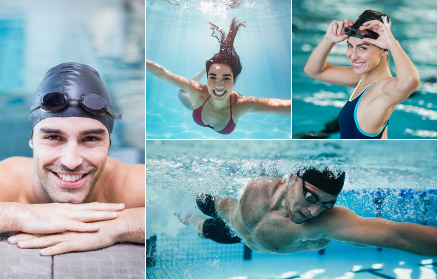Table of Contents
Swimming is one of the popular sports and many people enjoy it, at least on a recreational level. This happens especially in the summer, when the hot weather encourages you to cool off in a lake, reservoir or swimming pool. In winter, various indoor pools and aquatic centres come into play, or, if you are a fan of cold water therapy, you might enjoy frozen lakes.
Swimming brings not only fun, but also a number of health benefits and ways to keep you fit. For starters, one of the main benefits of swimming is that it engages a large number of muscles. In addition, it is suitable for almost everyone, regardless of body weight, thanks to less stress on the joints compared to other sports. Neither age nor physical condition plays a role in swimming. This activity can also be done by people who suffer from musculoskeletal pain and cannot run because of it. However, it is necessary to follow the correct technique, because, for example, swimming breaststroke with your head up will not benefit your body very much.
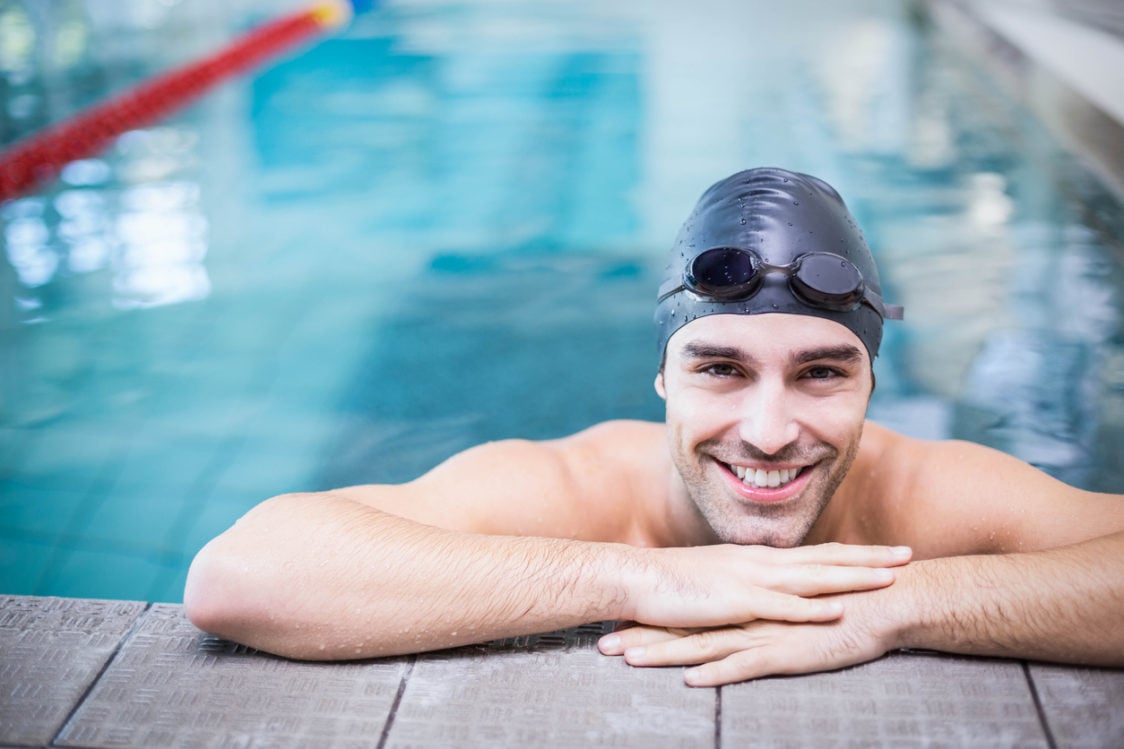
Why should you swim? 8 Benefits that will improve your life
Below is a list of eight benefits of swimming that will make you want to jump into a pool today.
1. Better sleep
The benefits of swimming, which is an aerobic physical activity, can be seen in many areas of life. Several studies have shown that sleep is no exception. For example, a smaller 16-week study focused on elderly people with sedentary jobs who suffered from insomnia. The group that regularly engaged in aerobic physical activity, which includes swimming, recorded better results in relation to the length and quality of sleep, as well as overall vitality.
At the same time, swimming, like other sports, can help reduce stress and high level of stress can have a negative effect on sleep. The best part is that you can observe this effect on yourself whenever you exercise. I’m sure that you feel that somehow, after working out, you sleep better and all problems are less meaningful. [1 – 2]
If you are further interested in this topic, be sure to read our article How to Fall Asleep Quickly? Try Simple Tips for Better Sleep.
2. Easier weight loss
Most people probably know that swimming can help burn a decent amount of calories. However, only few people realize that it can be as effective as running, which for many can be boring and unattractive.
If your opinion about running is similar, our following article can convince you otherwise: Is Running Boring? We’ll Reveal How to Take a Liking to It and Continuously Keep Improving.
Nevertheless, it is completely natural that everyone can enjoy a different physical activity. However, if your goal is to lose a few pounds, swimming can be not only fun, but also an effective way to do so. To move from theory to practice, the calorie-burning benefits of swimming are best highlighted with a concrete example. The MET thresholds (Metabolic equivalent of task) can help us with this, thanks to which you can calculate approximate values yourself. It expresses the energy you spend during a specific physical activity compared to rest.
One MET unit represents the difficulty of an hour of doing nothing. Thus, for example, if MET is equal to 3, it means that you will burn 3 times more calories during the given activity than if you were to just lie on the couch. This means that, for example, a 70 kg (154 lbs) man would burn 70 kcal while lying on the couch for an hour (MET = 1). However, if he were to engage in physical activity with MET 10, he would burn 700 kcal, which is a very decent amount. [3]
In the case of swimming, the values are in the following table, which shows an example of an average 65 kg (143 lbs) woman and an average 80 kg (176 lbs) man. If you want to customize them and find out how many calories you would approximately burn, the calculation is as follows:
Your Weight x MET = approximate caloric expenditure per hour
Caloric expenditure of an average man and woman [4]
| Swimming Style | MET | Expenditure of a 65 kg (143 lbs) woman per hour (KCAL) | Expenditure of an 80 kg (176 lbs) man per hour (KCAL) |
|---|---|---|---|
| Backstroke – Training or Race | 9.5 | 618 | 760 |
| Backstroke – Recreationally | 4.8 | 312 | 384 |
| Breaststroke – Training or Race | 10.3 | 670 | 824 |
| Breaststroke – Recreationally | 5.3 | 345 | 424 |
| Butterfly | 10.3 | 670 | 824 |
| Front Crawl – Speed approx. 4.1 km/h (2.5 mph) | 10 | 650 | 800 |
| Front Crawl – Speed approx. 2.7 km/h (1.7 mph) | 8.3 | 540 | 664 |
| Recreational Swimming (General) | 6 | 390 | 480 |
As you can see in the table, the expenditure of calories while swimming depends on the specific style. However, other factors must also be taken into account, including not only body weight and the duration, but also the intensity. These factors affect the total amount of calories burned, therefore, take them only as a guideline rather than as the truth set in stone. Each value applies to an hour of continuous activity at the given intensity.
If you want to refresh your swimming training and thus support even the burning of calories, you can try HIIT training. Alternatively, you can swim every 5th session to 80% of maximum intensity. Of course, you also have to bear in mind your swimming skills and fitness.
You might be interested in these products:
3. Improved Flexibility
It’s true that swimming won’t stretch your muscles like yoga or Pilates, but it can still serve as a great means of stretching. The maximum range of motion during swimming can effectively stretch tight muscles, which will then become more flexible. It also applies to the health aspect – for example for people who suffer from upper crossed syndrome. It occurs when the pectoral muscles and upper fibres of the trapezius become shortened, while the inter-scapular muscles are weakened. Regular swimming that can help solve this and contribute to better posture and mobility of the involved joints. [5]
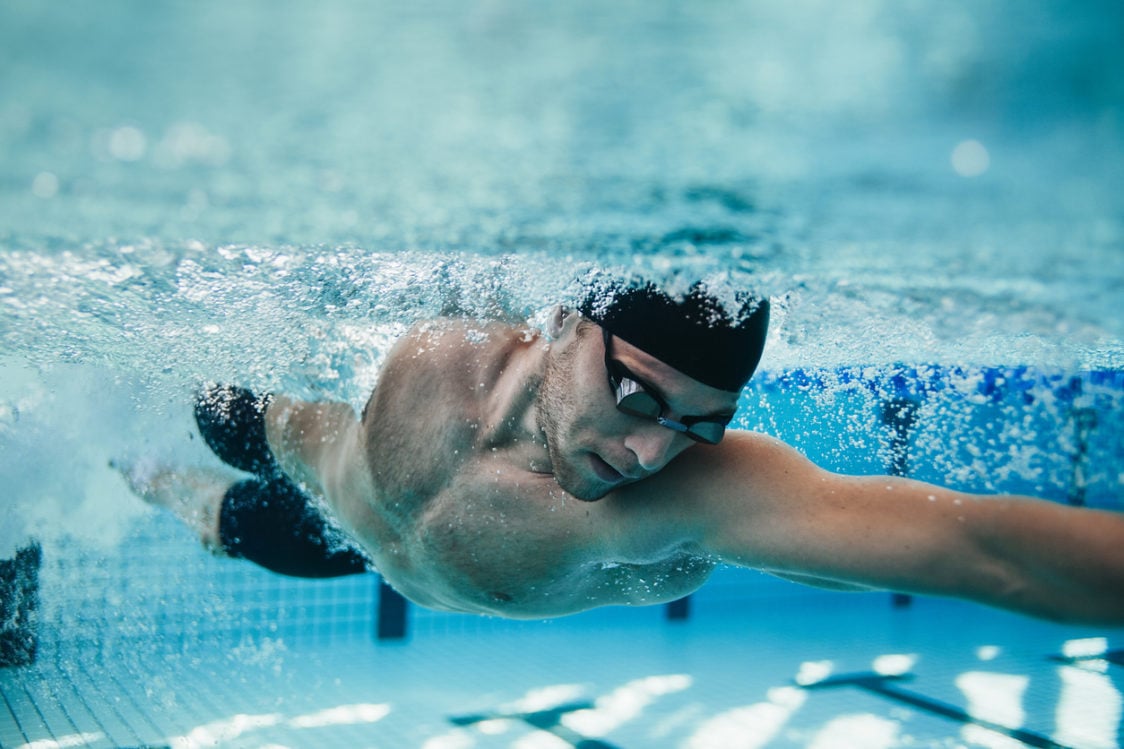
4. Effective training
Swimming is not only fun, but also a decent exercise for your body which has to overcome the resistance of the water, thus engaging many muscle groups at the same time. Depending on the swimming technique, you even work with muscles that you normally or regularly don’t use. You engage the shoulders, abdomen, entire back, forearms, gluteal muscles and hamstrings. Thanks to this, you can effectively exercise the muscles of the whole body. So whether your favourite style is butterfly, breaststroke or front crawl, the fact remains that it can serve as a full body workout.
Swimming also helps build strength, endurance and speed. In the case of endurance, continuous swimming can be a great way. Speed and strength can be built thanks to speed swimming, like HIIT. [6]
5. Positive effect on mental health and mood
Swimming does not only bring physical benefits. Maybe you didn’t even know that it can contribute to improving your mood. In this case, the principle is similar to other types of physical activities, during which endorphins are released in your body. Thanks to them, you then feel more relaxed, happier and more at ease. If you are no stranger to swimming, you have probably already noticed these feelings. For example, when you felt like swimming after a hard day and then you left your worries somewhere between the sixth and seventh session.
Swimming and mental health
Various studies have been devoted to the effect of swimming on mental health. Their findings include, for example, that [7 – 10]:
- regular swimming can be effective in fighting depression
- A 10-week swimming program was able to contribute to reducing anger or fatigue and improved mood or subjective feelings of well-being
- swimming significantly improves mood
Regular physical activity also brings many other benefits. If you want to learn more about them, read our article Why Should You Exercise? Stronger Immunity, Heart Health and 8 Other Reasons.
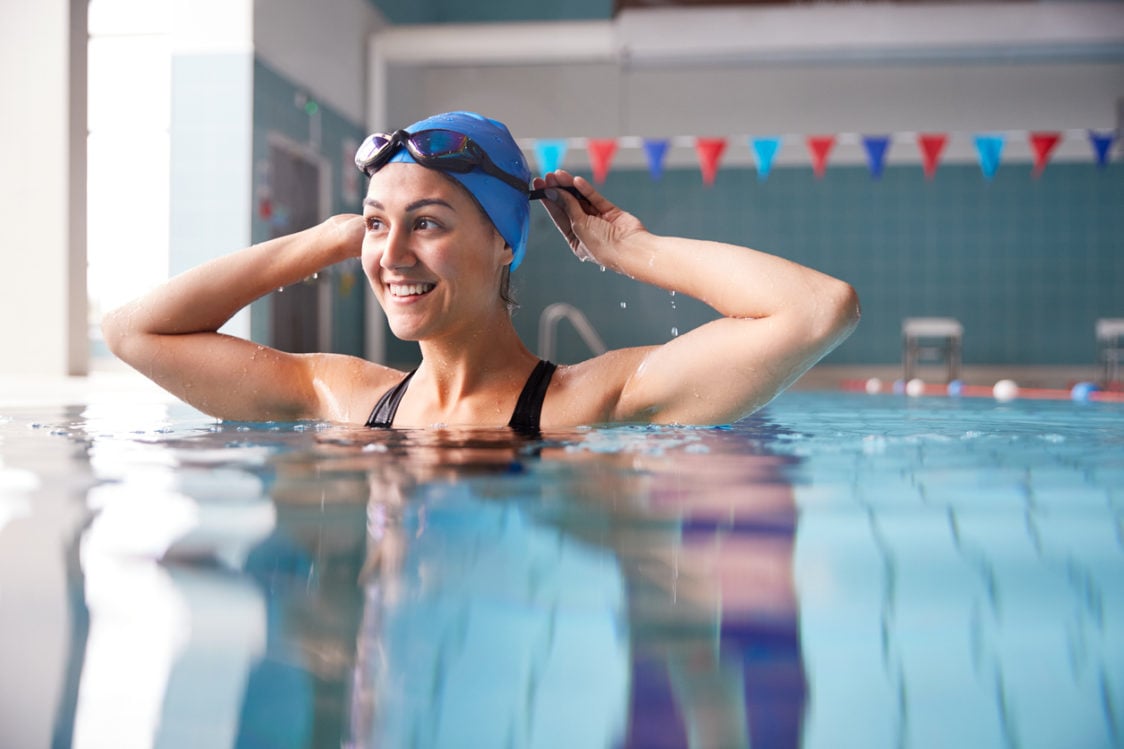
6. Improved fitness
One of the key components of swimming is optimal breathing, which affects your aerobic capacity. Regular swimming training contributes to its increase, thanks to which you can use oxygen more efficiently. The greater the adaptation to training and the larger the capacity of your lungs, the greater the volume of air you can handle. As a result, this will be reflected in the improvement of your overall shape. Thanks to this, for example, you will no longer struggle to get up the stairs or catch the bus which is about to leave. Thanks to swimming, you also work on your aerobic capacity without sweating. However, it is not only the work of the lungs, but of the entire circulatory system. Thanks to swimming, the work of the heart improves, as well as the efficiency/quantity of mitochondria, which are small power plants in every cell that produce energy. [11]
7. Ideal for people of all ages, including pregnant women
One of the key advantages of swimming over other physical activities is that the water makes your body float, so your limbs carry only a fraction of your weight. This is a low-load exercise that does not put pressure on the spine, does not burden the skeletal system, joints, knees or hips. It can therefore be ideal for older people and the NHS (National Health Service) recommends it even for pregnant women for the same reasons. [15]
Reducing the load allows swimmers to more easily move their limbs to their full extent. Regular swimming training can thus help to maintain elasticity and flexibility, but also exercise stabilizing muscles, which are important for maintaining overall vitality not only in older people. This statement is also supported by a study that followed men older than 70 years and compared a group of swimmers and non-swimmers. Those who swam were 33% less likely to fall compared to non-swimmers. [12 – 14]
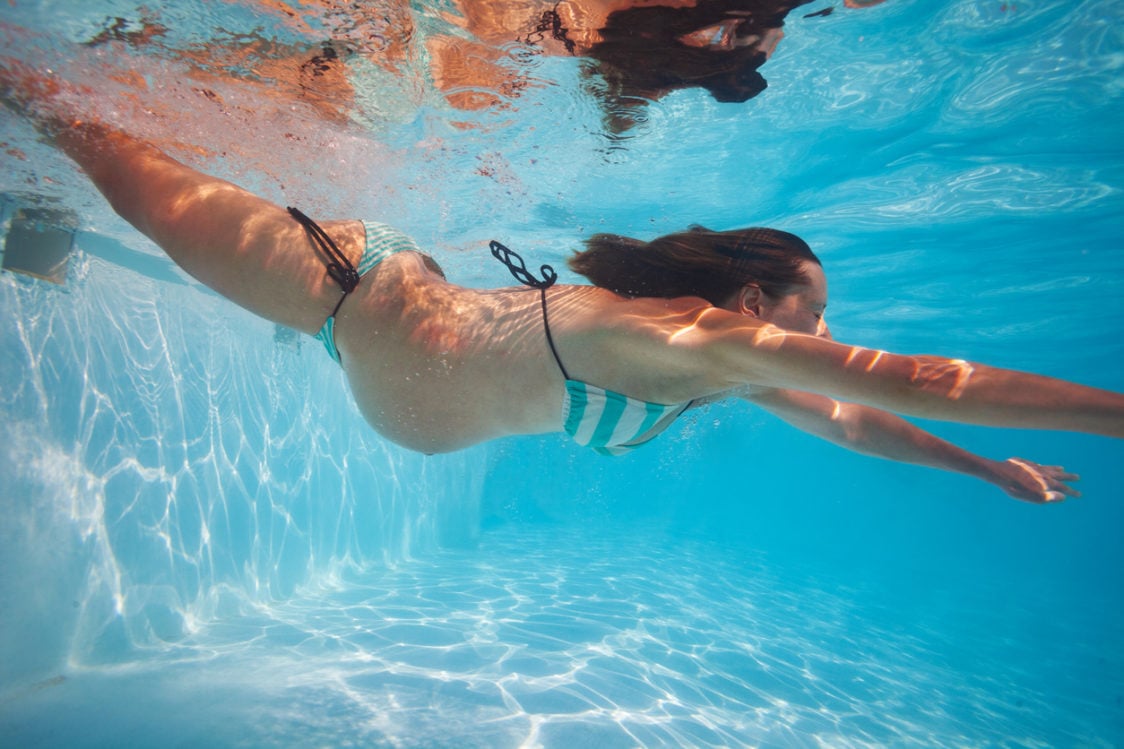
8. Improved physique
When you look at the physical condition of swimmers, it is clear that the sport they practice plays a big role in their physique. During swimming, a large number of muscles is used, which naturally leads to their development. Over time, thanks to training adaptation, you can work towards a greater proportion of muscle mass and, on the other hand, a smaller proportion of fat and better blood values. As a result, you can contribute to a better body composition and shape. [16 – 17]
Conclusion
Swimming is one of the great sports activities. Thanks to the fact that it does not burden the joints, even elderly people and pregnant women can benefit from it. It is therefore suitable for everyone regardless of age. It can help you lose weight, improve your physique or fitness. Furthermore, it can serve great as a main or additional physical activity. However, one should keep in mind the correct technique, which is the key to maximizing the effects of swimming on your health. If you’re not sure about your technique, it’s definitely a good idea to hire a coach at the beginning to point you in the right direction. That’s it – All hail the swimming!
[1] Kathryn J. Reid, Kelly Glazer Baron, Brandon Lu, Erik Naylor, Lisa Wolfe, Phyllis C. Zee - Aerobic exercise improves self-reported sleep and quality of life in older adults with insomnia – https://www.ncbi.nlm.nih.gov/pmc/articles/PMC2992829/
[2] Claire McDanie - Swim Stress Away: 5 Mental Health Benefits Of Swimming – https://clearcomfort.com/blog/swim-your-way-out-of-depression/
[3] Tuomo T. Tompuri - Metabolic equivalents of task are confounded by adiposity, which disturbs objective measurement of physical activity – https://www.frontiersin.org/articles/10.3389/fphys.2015.00226/full
[4] Compendium of Physical Activities - Water Activities – https://sites.google.com/site/compendiumofphysicalactivities/Activity-Categories/water-activities
[5] D Lum, G Landers, P Peeling - Effects of a recovery swim on subsequent running performance – https://pubmed.ncbi.nlm.nih.gov/19908172/
[6] 8 benefits of swimming whatever your fitness level - – https://www.swimming.org/justswim/8-benefits-of-swimming/
[7] B G Berger, D R Owen - Mood alteration with yoga and swimming: aerobic exercise may not be necessary – https://pubmed.ncbi.nlm.nih.gov/1484805/
[8] Dr. Samantha Wild - Six ways swimming benefits your mental wellbeing – https://www.bupa.co.uk/newsroom/ourviews/benefits-of-swimming
[9] MorganJacksona, Manjot Kanga, James Furnessab, Kevin Kemp - Aquatic exercise and mental health: A scoping review – https://www.sciencedirect.com/science/article/pii/S096522992200022X
[10] Heather Massey, Ngianga Kandala, Candice Davis, Mark Harper, Paul Gorczynski, Hannah Denton - Mood and well-being of novice open water swimmers and controls during an introductory outdoor swimming programme: A feasibility study – https://onlinelibrary.wiley.com/doi/10.1002/lim2.12
[11] Kristina Swartzendruber - Benefits of swimming for physical activity – https://www.canr.msu.edu/news/benefits_of_swimming_for_physical_activity
[12] Swimming for Seniors – https://www.asccare.com/swimming-for-seniors/
[13] 6 Benefits of Swimming for Older Adults – https://www.seniorlink.com/blog/6-benefits-of-swimming-for-seniors
[14] Karen Rowan - Why Swimming May Be the Best Exercise for Older Adults – https://www.livescience.com/48336-swimming-best-exercise-older-adults.html
[15] Exercise in pregnancy – https://www.nhs.uk/pregnancy/keeping-well/exercise/
[16] Bo-Ae Lee, Deuk-Ja Oh - Effect of regular swimming exercise on the physical composition, strength, and blood lipid of middle-aged women – https://www.ncbi.nlm.nih.gov/pmc/articles/PMC4625655/
[17] Ian M Lahart 1, George S Metsios - Chronic Physiological Effects of Swim Training Interventions in Non-Elite Swimmers: A Systematic Review and Meta-Analysis – https://pubmed.ncbi.nlm.nih.gov/29086218/

